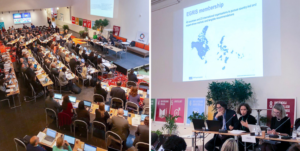Tasked to develop and implement the global indicator framework for the goals and targets of the 2030 Agenda, the Inter-agency and Expert Group on SDG Indicators (IAEG-SDGs) recently gathered in Sweden for a three-day meeting aimed to progress their work that started in 2015.
Hosted by SIDA, the meeting included a dedicated working group on data disaggregation, which saw IAEG-SDGs members discussing this important issue alongside invited stakeholders and observers. Natalia Baal, JIPS Coordinator, was pleased to be able to join both meetings in an observer capacity and, alongside UNHCR, shared the work of EGRIS as a basis for advocating for disaggregating SDG indicators by refugee status and for IDPs.

For the first time since it was established, the IAEG-SDGs dedicated a whole working day to the topic of disaggregation in the sidelines of their regular meeting. Member states – a subgroup of IAEG-SDG members and observers including a number of UN Agencies, NGOs and the World Bank – took part in the meeting to discuss the challenges and opportunities of disaggregation and to develop a roadmap for shaping guidelines on the topic to be submitted to the UN Statistical Commission in 2019.
The discussion covered a number of important topics and reflected different valuable perspectives, balancing overall the need for a normative approach – to enable the visibility of vulnerable populations in SDG monitoring in order to leave no one behind – while considering the feasibility and potential burden on national statistical systems of producing such disaggregated data.
Fresh from the UN World Data Forum -where the issue of capacity development for national statistical systems was very present, as necessary to improve data on vulnerable populations within the Agenda 2030-, the working meeting managed to balance the discussion by outlining a way forward including:
Although discussion ultimately focused mostly on process and several cross-cutting issues without diving into too much detail on specific vulnerable groups and other categories for disaggregation, JIPS and UNHCR as EGRIS Steering Committee representatives, took the opportunity to advocate for disaggregation by refugee status and for IDPs within a prioritised list of SDG indicators.
As both refugees and IDPs are recognised as vulnerable groups within the SDG Declaration, the connection was straightforward to make: “People who are vulnerable must be empowered. Those whose needs are reflected in the Agenda include all children, youth, persons with disabilities, people living with HIV/AIDS, older persons, indigenous peoples, refugees and internally displaced persons and migrants.”
The challenge was instead, finding the right avenue to articulate the critical nature of this disaggregation and pointing the IAEG-SDGs in the direction of good practice, tools and guidance to make use of.
During the main IAEG-SDGs meeting, UNHCR and JIPS together presented the work of EGRIS specifically focusing on achievements made to date in producing the International Recommendations on Refugee Statistics and the ongoing work on IDP Recommendations based on the existing Technical Report. Tools and guidance such as the JET, available through the UNDG’s SDG Acceleration Toolkit, as well as the offer of technical support and advice to government and national statistical offices, were also shared.
Beyond data disaggregation, the IAEG-SDGs meeting covered several other agenda items including most significantly reviewing the tier classification of indicators within the framework and outlining the process for the planned comprehensive review of the framework in 2019-2020 including the limited possibility of considering additional indicators to be included. Many politically sensitive issues were addressed, both directly and indirectly, as the agenda progressed.
Remarkably, this uniquely professional and dedicated group of statisticians worked cohesively through a long list of technical issues, joint decision-making and a transparent process to strengthen this common framework for global measurement towards the achievement of politically agreed upon sustainable development goals.